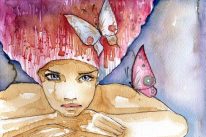
“When you arise in the morning, think of what a precious privilege it is to be alive—to breathe, to think, to enjoy, to love.” ~Marcus Aurelius
I remember attending a lecture by the Tibetan monk Sogyam Rimpoche, author of The Tibetan Book of Living and Dying, in which, smiling all the while, he confessed, “So many people, they say, ‘I’m not afraid of death.’I tell you, they’re lying! Death? Very scary. Me? I’m very scared of death.”
And I thought to myself, “Phew, if he’s scared, then it’s certainly okay that I’m scared too.”
For many years after that, I carried a question around with me. “Have I lived enough yet?” Without hesitation my answer was always, “No way! Not by a long shot!”
And then I’d follow this up with all the reasons why I wasn’t yet satisfied—I hadn’t left a mark on the world, wasn’t married yet, didn’t have children, didn’t know who was going to win this season of whatever reality TV show I was following.
Even after I had built a decent career for myself, published a book that I know helps others, got married, had two adorable sons, and found out who won that season (and many others) of various TV shows and sports, the question and its familiar response still remained. Had I lived enough yet? No!
It suddenly dawned on me that, if I continued to think this way, I would never experience fulfillment. I’d never arrive at that mythical destination I’d set out for myself where I’d finally cease yearning for more. Especially now that I had kids, this became abundantly clear.
I’d always want to see what came next in their lives, to witness each step upon their journey into and throughout adulthood.
Then if they had kids, I’d want to share as much of their lives as possible too. Feeling so much love in my heart, I knew I’d never reach a place where I’d had enough. I’d always want more.
Realizing that I was chasing what could never be caught, I stopped to pose myself a new question.
I asked, “What do I want my last thought in this world to be?” And my answer came back as something like, “I’d want to be thinking, Ahhhhh, that was good… that was nice… that was enough…”
This new question might not have helped me much, if I didn’t remember something else, namely, that how we live this moment is the best predictor of how we will live in the future.
So, it then occurred to me that, if I wanted to be thinking I have lived enough in the future, then the best way to get there would be to live with that exact same thought right now.
Immediately, I started asserting this new notion that, already, I had actually lived enough. After all, there are many humans that are not blessed with the experience of even a second day of life on earth. How greedy was I willing to be? How selfish and ungrateful?
The deeper this pronouncement that I had lived enough sunk into me, the greater the shroud of fear surrounding death lifted.
Whether I initially had believed this or not, I slowly grew to the place where I knew, beyond any doubt, that I had lived enough. Yes! I had already lived enough! And, just like that, all my fears vanished and I finally felt free, overflowing with a sense of appreciation and contentment.
Ever since, I’ve been discussing this concept of “enough” with others in the throes of grief and loss.
What I explain is that “enough” is always a value judgment, rather than something that can be quantified or measured. It’s about perspective, a determination on our part to choose gratitude for what we’ve been granted over regret for what we have lost or fears about what we might lose.
This can be tremendously powerful, though admittedly very hard at times. Is it possible to view the death of a young child and understand that he or she lived enough?
Can a parent suffering through such a loss perceive their abbreviated time with their son or daughter as enough?
When a friend or parent or anyone else we care about passes away, can we experience the time we had with them as enough?
The answer is yes. It is possible, if and when we choose to exercise our right to invoke this perspective.
We can view whatever time we’ve been given through the continually available lens of gratitude, appreciation, celebration, and love. We can understand each moment as a gift, as “enough.”
To be a human is little short of a miracle. In the limitlessly vast universe of atoms and particles and stars and planets, gases and quarks and molecules, stones and trees and bugs and platypuses, of all the possible manifestations of life that are possible, we have been given the rarest of privileges of experiencing what it is like to be human. That’s cool!
Just by being here, we’ve already beaten the odds, no matter how many more minutes of this miracle we get to experience.
We know when we lived enough by knowing this right now, during this and all future moments, even while we crave to drink in as much as life continues to offer us. We appreciate that no more is needed.
We’re thankful and, from the wisdom of this thankfulness, we smile, at ourselves and all around us. We’ve already lived enough—and that’s a beautiful thing.
Woman with hourglass image via Shutterstock
About Jason Fischer
Formerly a Buddhist monk, Jason B. Fischer, MA, LPC is the author of The Two Truths About Love: The Art & Wisdom of Extraordinary Relationships (New Harbinger, 2013) as well as the Founder and Clinical Director of Plumeria Counseling Center in Austin, Texas. He is a therapist, writer, public speaker, husband, and father of two beautiful sons.












 Though I run this site, it is not mine. It's ours. It's not about me. It's about us. Your stories and your wisdom are just as meaningful as mine.
Though I run this site, it is not mine. It's ours. It's not about me. It's about us. Your stories and your wisdom are just as meaningful as mine.
It’s my 22nd birthday today, and I can’t say I’m very happy about it. While I’m young in human years I have a constant nagging that I’m just not moving quickly enough and that time will run out before I ever experience enough. This article is a good reminder that a change in perspective can make all the difference. Thank you for the lovely birthday gift!
Happy Birthday!!! I’m thrilled I could help you celebrate in this one special way.
Great post Jason! I had a friend who died a couple of years ago, in his early 60s. In our final conversation, he told me that it didn’t bother him to die because he had lived the life he wanted to live. The thing about my friend is that he certainly had his challenges in life but he was always John. No matter what job he had, no matter what situation he found himself in, he was John. Which is what I think he meant about living the life he wanted to live.
BTW, for anyone who’s reading this, Jason’s book – The Two Truths About Love – is fantastic! I highly, highly, highly recommend it!
Ed,
Thank you so much for the fine compliment! Living the lives we want to live, right now (even whilst we strive for the future lives we want to live), is indeed precious guidance. Plus, seeing our lives as “enough” right now offers such an emotional reward that it’s like giving ourselves a surprise present. And best of all, we can keep giving it to ourselves (and by extension everyone around us) each and every moment of our lives.
From the mention of that Marcus Aurelius quote to the final points made about wanting more time to live “enough,” this was good read! There are so many little nuggets of wisdom, or rather, useful perspectives on making better use of the time we’ve already been given, that I’m so glad to have come across this post.
I like how you put the ongoing quest for more life to live as chasing what could never be caught. If our current way of living is the best predictor of how we will live in the future, then your points of choosing between gratitude and regret are all the more important to consider when shaping our thoughts and perspectives about death and fears of what we might lose. It’s so easy to get lost in the moment or sidetracked that one’s life can flash by quicker than preferred. That’s why I believe it’s reflections like what you’ve offered up here that are so vital to helping one stay mindful about the privilege of being alive. Thanks for sharing your perspective on the subject of living and dying.
Thanks commenting, Nicole. I firmly believe that gratitude is one of the most powerful emotional tools at our disposal in life. In particular, I’m certain it is the antidote for most so-called depression that inflicts so many folks. Again… THANKS
well said
Cheers!
Hi Jason,
So glad to have found you. I’ve been studying Buddhism for awhile. One thing I found out early on was how Buddhism differs totally from Christianity, is the whole death and dying concept. I am embracing learning how to look at the way I had been taught, and how I’m changing my view of daily living and my life in general. Learning to think outside of my box, that, and a family member surviving a MI at age 52 helped me to look at living differently, better, and being comfortable with the now.
Thanks for your journey and sharing your wisdom with us.
Light and Love,
Stella
You’re welcome, Stella. I’m always a fan of looking outside of our boxes. We’re taught so many things in life that cultivating true wisdom starts with a process of subtraction (and quite possibly ends there too). We examine our assumptions about “the way things are” from alternative perspectives to see what else may be possible. In my own work, I tend to focus on spreading ideas that at first seem fairly outlandish, like how “lying is okay”, “suicide is a bright idea”, “we have 100% control of every relationship”, “there are no needs” (my TEDTalk). If we wanted to read some of my other articles, you can find them on my personal blog: http://www.jasonbfischer.com
Light and Love back at you,
Jason